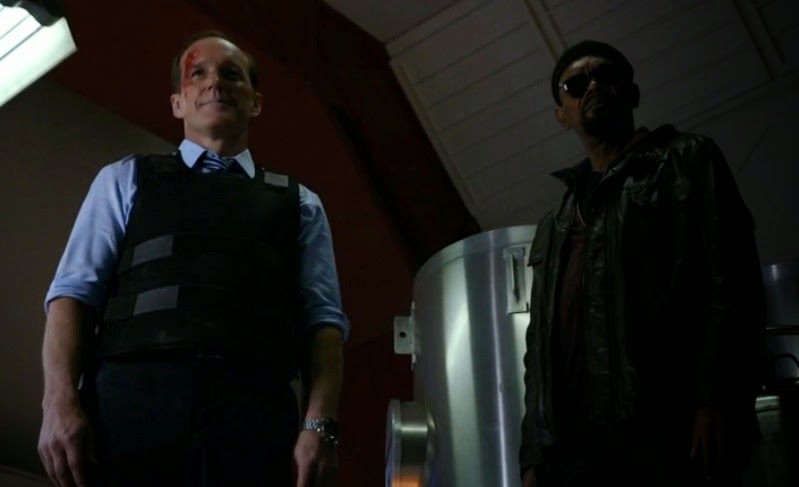 We’ve come to this, finally: the end of the first season of Marvel’s Agents of S.H.I.E.L.D. “The Beginning of the End” was as good as I could reasonably have expected it to be, packed with great moments and doing a lot of heavy lifting for season 2. This season’s Big Bad was effectively and cathartically dealt with, and our plucky band of heroes has made it through mostly intact, while avoiding a pair of glaringly obvious narrative traps that I’d been crossing my fingers against. Why, then, am I left wondering if it was all really worth it and not feeling enthusiastic about a second season? (Spoilers ahoy.)
We’ve come to this, finally: the end of the first season of Marvel’s Agents of S.H.I.E.L.D. “The Beginning of the End” was as good as I could reasonably have expected it to be, packed with great moments and doing a lot of heavy lifting for season 2. This season’s Big Bad was effectively and cathartically dealt with, and our plucky band of heroes has made it through mostly intact, while avoiding a pair of glaringly obvious narrative traps that I’d been crossing my fingers against. Why, then, am I left wondering if it was all really worth it and not feeling enthusiastic about a second season? (Spoilers ahoy.)
At the end of last week’s episode, things were looking grim for Team Coulson. Fitz and Simmons were headed to the bottom of the ocean in a shipping container, thanks to turncoat Grant Ward. The rest of the team was left facing down a squad of cybernetic, Centipede-enhanced Deathlok soldiers in a basement in Havana. And John Garrett, having just been outed as the first Deathlok, upped the ante by ascending to a higher plane of consciousness and dispensing with his pesky mortality.
While May manages to fight off the Deathlok Corps fairly easily once she gets her hands on the Asgardian rage staff from back in episode 8 (“The Well“), Fitz and Simmons aren’t quite so lucky. As they first find themselves having to accept their imminent deaths, and later as a less-than-ideal escape plan presents itself, their interplay lends the episode emotional heft and some quiet moments. Trapped and injured, with little in the way of supplies or oxygen, the writers could have taken the easy or safe route and had one or both of these two very empirical, very logical characters experience a foxhole conversion. Instead what we got was a very convincing, heartfelt examination of how an atheist would address mortality. Fitz has always believed that the time after death would be no different, no better or worse than the time before birth. Simmons eloquently restates the inherent beauty of the Second Law of Thermodynamics, that the energy and matter in her has been part of an unbroken line of stars, objects, and living beings going back to the beginning of the universe, and that energy would continue that line forever.
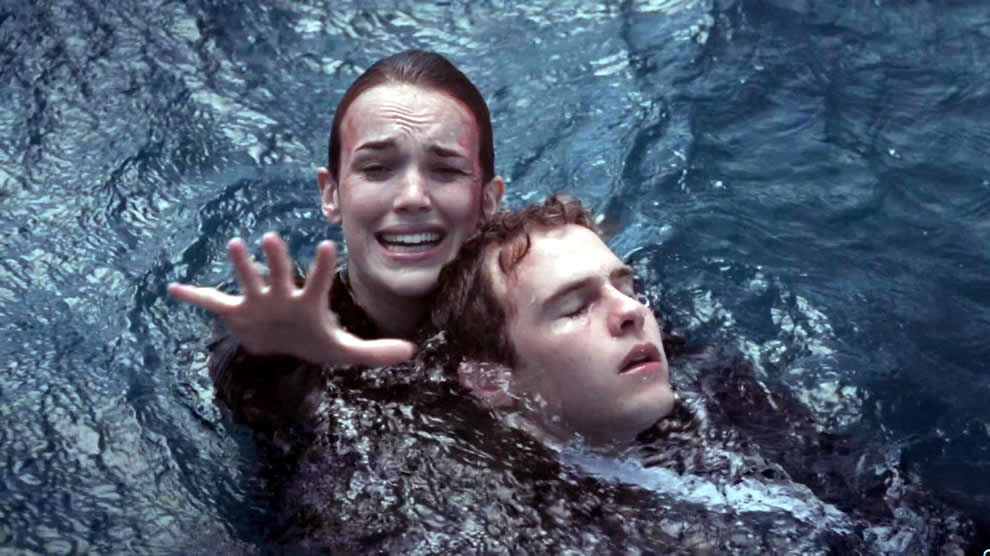 Throughout their time onscreen, Iain De Caestecker and Elizabeth Henstridge are just phenomenal. Even staring death in the face, Fitz is unable to properly express his feelings, and Simmons absolutely crumbles when realization finally dawns on her that he loves her and is willing to sacrifice his life for hers. This being a Mutant Enemy show, I sincerely expected that Fitz’s sacrifice would be final and he would in fact give his life for her. While the show makes it clear that he survived, we don’t know what condition he’s in, aside from the damage being catastrophic and possibly permanent. While the last minute reprieve deprived the show of additional gravity (which could only have helped, given its ongoing problem with petty stakes), it would have been a shame to break up FitzSimmons.
Throughout their time onscreen, Iain De Caestecker and Elizabeth Henstridge are just phenomenal. Even staring death in the face, Fitz is unable to properly express his feelings, and Simmons absolutely crumbles when realization finally dawns on her that he loves her and is willing to sacrifice his life for hers. This being a Mutant Enemy show, I sincerely expected that Fitz’s sacrifice would be final and he would in fact give his life for her. While the show makes it clear that he survived, we don’t know what condition he’s in, aside from the damage being catastrophic and possibly permanent. While the last minute reprieve deprived the show of additional gravity (which could only have helped, given its ongoing problem with petty stakes), it would have been a shame to break up FitzSimmons.
The big reason they managed to survive at all was a nick-of-time (no pun intended) save by former Director of S.H.I.E.L.D. Nick Fury, in an appearance that stretched far beyond a simple cameo. Samuel L. Jackson is in nearly every scene after he shows up to save the science team, alternately functioning as a quip machine and massive deus ex machina. I’d complain, but, frankly, that’s always been Fury’s role in the movies and the comics, and it certainly helps that Jackson seems to be having fun undercutting everyone.
Besides, there really is a need for someone with a talent for deflating egos. After getting his massive injection of GH-325, John Garrett went from a villain with surprisingly and refreshingly small scale motivations (to the point where his machinations were almost disproportionate to his actual goals) to a grandiloquent megalomaniac that had trouble being taken seriously, even by his own people. While he did partially resolve the issue by stabbing one of the Joint Chiefs to death with his own rib, the fact remained that John Garrett ended up getting a bit pompous.

This, of course, leaves Ward, the truest of Garrett’s true believers, very much in the lurch. As far as Ward is concerned, their mission is done, and so he finds himself adrift and wanting orders. Thankfully, this does not mean that Ward has a change of heart. Oh, no, he gets his, in the form of Melinda May, in what is possibly the best fight I’ve seen on a TV show in a long, long time. There are brutal hits, spinning saw blades, various power tools, and Ward goes down after having his foot nail gunned to the floor and his larynx crushed by one hell of a punch. All the while I was grateful to the creative team for not going the obvious route and redeeming a character who has proven himself to be, essentially, a mindless, cold-blooded killer.
Ward, in fact, may be the only mindless killer on the show. As we know, Deathlock, and the Centipede soldiers are controlled by a remote killswitch installed in their electronic eye (first seen in episode 4, “Eye Spy“), as well as having their family members held hostage, at least in the case of Mike Peterson. But until now, we’d never seen behind the curtain. What kind of monsters would be willing to play other humans like videogames?
But it’s not monsters behind the scenes at Garrett’s operation. The people who run the cybersoldier program are victims as well having had their loved ones taken from them, held hostage, and forced to work as handlers for the Deathlok program. When May and Skye set out to free Mike’s son Ace and deprive Garrett of his most powerful weapon, they end up liberating a score of families from a system of indentured servitude that is as high tech and grandiose as it is thuggish and venal.
At every turn, Garrett has been so much less than meets the eye – that’s what I’ve liked about him, honestly. He was a mastermind who wasn’t above it all. His eventual defeat was almost deliciously anticlimactic. Taken down in battle by Coulson and Fury (with Coulson wielding the Destroyer gun from The Avengers), he manages to escape, encasing himself in a new, deadlier version of the Deathlok armor – only to be unceremoniously popped like a balloon with the plasma blasting 0-8-7 from Episode 2.
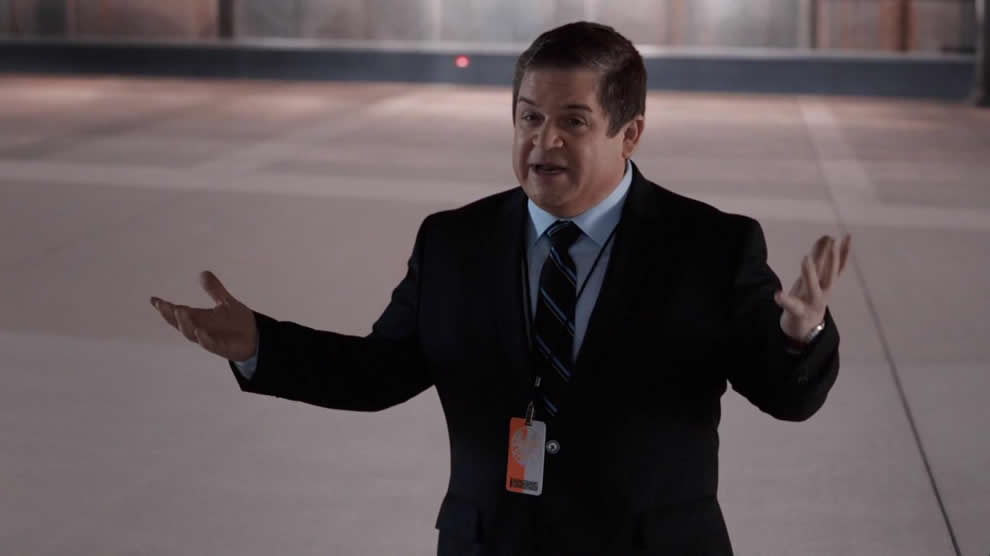 Garrett’s defeat is followed by what amounts to scene after scene of stage-setting for next season. Fury fades back into the ether, leaving Coulson with a mandate to rebuild S.H.I.E.L.D. as a smaller, more careful organization. Presumably this means a lean, non-governmental group of dubious legality operating on a shoestring budget. The team has a new secret base manned by returning castmember Patton Oswalt as Billy Koenig, who is so similar to his deceased brother Erik that it seems like they came off the same assembly line (hint, hint). To an unknown extent, Fitz is permanently changed by his injuries and near-drowning. Ward is imprisoned and destined for quite a bit of active questioning from May. Triplett did the only thing I wanted him to do in this episode and managed to survive to the end of the season. Skye, well, Skye continues to be the mysterious Chosen One, ignorant of all the hints that Reina dropped regarding Skye being the next stage of human evolution. Finally, Coulson begins to exhibit some of the same symptoms of GH 325 that Garrett did near the end, leaving us with the impression that he was right to have feared the Tahiti program after all.
Garrett’s defeat is followed by what amounts to scene after scene of stage-setting for next season. Fury fades back into the ether, leaving Coulson with a mandate to rebuild S.H.I.E.L.D. as a smaller, more careful organization. Presumably this means a lean, non-governmental group of dubious legality operating on a shoestring budget. The team has a new secret base manned by returning castmember Patton Oswalt as Billy Koenig, who is so similar to his deceased brother Erik that it seems like they came off the same assembly line (hint, hint). To an unknown extent, Fitz is permanently changed by his injuries and near-drowning. Ward is imprisoned and destined for quite a bit of active questioning from May. Triplett did the only thing I wanted him to do in this episode and managed to survive to the end of the season. Skye, well, Skye continues to be the mysterious Chosen One, ignorant of all the hints that Reina dropped regarding Skye being the next stage of human evolution. Finally, Coulson begins to exhibit some of the same symptoms of GH 325 that Garrett did near the end, leaving us with the impression that he was right to have feared the Tahiti program after all.
In the end, I didn’t find any of these teases all that thrilling. The episode was great, with wonderful action and some cheer-out-loud moments. But, as far as I’m concerned, the storyline resolution and the setup for next season, weren’t the series redemption that I needed it to be. I’m just not invested in Skye’s story. The showrunners still haven’t been able to make a case for why she’s so special. Is she a useful, perhaps even vital, member of the team? Sure, but lacking any evidence that she’s anything more than baseline human, I’m not impressed.
Nor am I able to suspend my disbelief that it’s taken Coulson almost a year to reach the point that Garrett did in less than a second. Maybe it’s a smaller dose of GH 325? Maybe Coulson’s strength of character helped him avoid the side-effects? It takes a plot point that was never addressed since its discovery a few months ago (that the serum that brought him back has mental side effects) and suddenly elevates its importance without preamble. Again, having some kind of build-up to the strangeness here and there over the course of the season would have made the moment a logical story beat, rather than an out-of-left-field final sting.
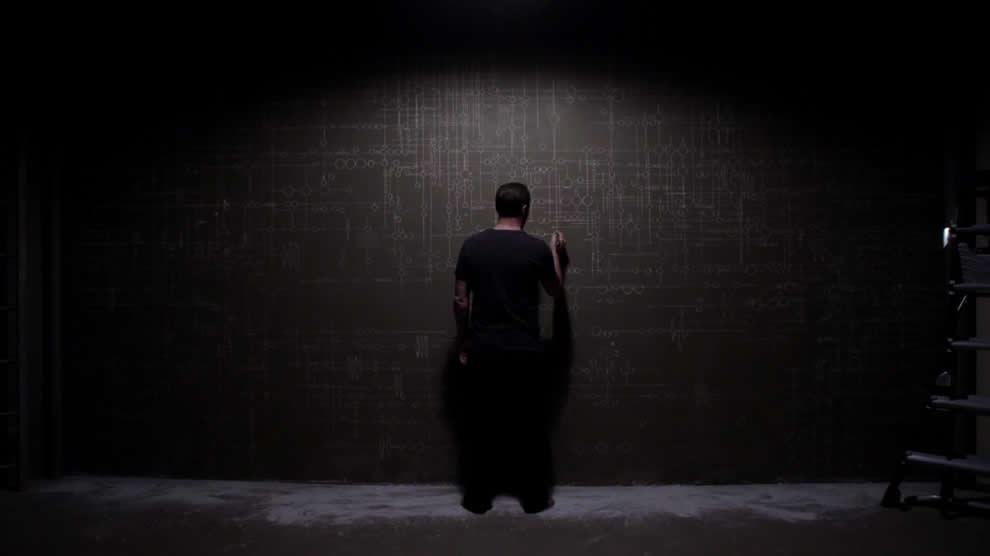
Even though I’ve sung the show’s praises in the second half of the season, the structural problem of Agents of S.H.I.E.L.D. was reiterated in this final episode. It’s a serialized drama, and like all serialized dramas, the showrunners want the audience to become invested in the show’s mythos, to keep coming back to see the payoff to carefully built plot points. Unfortunately, even at its best, S.H.I.E.L.D. has not been great about caring for its overarching story. During the pre-Captain America: The Winter Soldier portion of the show, the story was mainly in a holding pattern, consisting primarily of Problems of the Week that did little to advance the overall plot. The second half was much better, but had a tendency to string along some plot points with no payoff or resolution, while introducing and almost immediately closing the book on others. Ideally what we should have is a series of questions that grow gradually more complex and are answered in a way that is logical, leading to other, bigger questions. Instead, much of the plot has been constructed as either neverending shaggy dog stories, or barely satisfying one-liners.
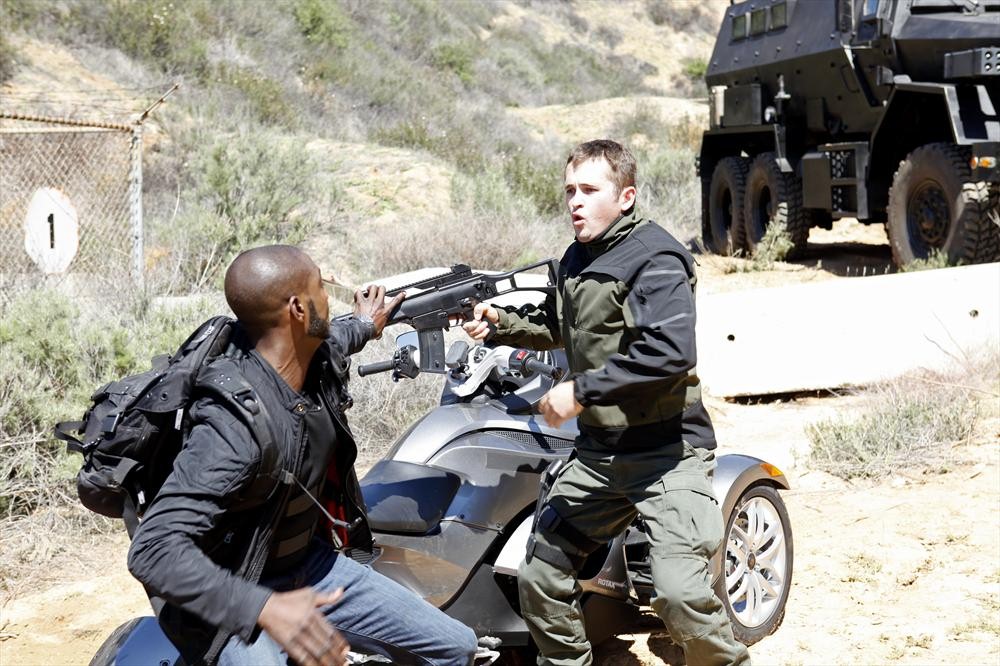
At least, and this is key, Agents of S.H.I.E.L.D. got over some of its most egregious early habits in terms of its casting, its use of international locales, and its tendency toward stereotyping. Though I fear that a new season and a new budget will result in more international travel, so perhaps we’ll see this sort of thing again, come Season 2. For now, though, especially after having added Triplett to the cast, making Reina and Mike Peterson regulars, and simply giving agent May more to do, some of my complaints on that score have faded into the background.
A good season finale should make it impossible to wait for the next season. It should serve as either a fitting coda for the series (in the case of shows where renewal is uncertain) or leave us with interesting new questions to ponder. Agents of S.H.I.E.L.D. did neither. I appreciate the end of the Hydra/Garrett storyline, but unless something really interesting happens in the MCU between now and next fall, I don’t think I’ll be tuning in again.

